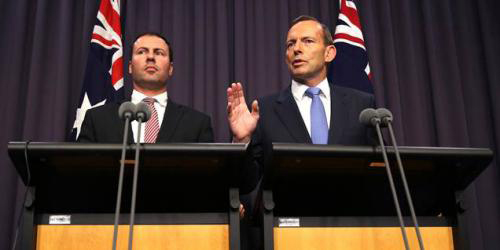Federal Govt sorts out industry and innovation landscape
AUSTRALIAN business – large and small, strong and struggling – has been waiting for the Federal Government to announce its framework for industry, innovation and start-up support. It happened last week and is – sensibly, for a business sector craving movement as much as stability – more evolution than revolution.
The Industry Innovation and Competitiveness Agenda strives to provide certainty on issues that have plagued Australian business – such as business migration rules, a draconian approach to employee shares that have stifled start-up technology ventures, lack of early-stage business funding, over-regulation and education and training regimes that lag their real markets – and introduce a more collaborative approach to help drive new ventures. 
The reason is that new and early-stage ventures are where Australia may be able to play to its advantage – and it is where most job growth occurs.
Prime Minister Tony Abbott and Industry Minister Ian Macfarlane jointly released the Industry Innovation and Competitiveness Agenda on October 14. The plan takes a holistic approach to reform, embracing taxation, investment, skilled migration, collaboration, regulation and training in the mix.
For government it is all about trying to drive competitiveness and ‘productivity’. For business it is more about providing a stable and less restrictive environment that will favour innovation and encourage collaboration between researchers and industry – an area in which Australia consistently fails.
And it aims to speed up business growth by unshackling it from unnecessary regulation. An early announcement has been the move to accept international standards and risk assessments for certain product approvals, rather than impose Australia’s own regime.
An example of where this has brought Australia unstuck has been in the biotechnology sector where Australian companies have opted to seek approvals through the US Food and Drug Administration (FDA) rather than navigate the punitive small-market Australian Therapeutic Goods Administration (TGA) process. An FDA approval to a giant market has often been easier than TGA’s stamp to a very small market.
“Building on our deregulation agenda, the government will adopt a new principle that Australian regulators should not impose additional requirements beyond those already applied under trusted international regulation, unless it can be demonstrated there is good reason to do so,” Prime Minister Abbott said. “The government will review existing regulation against this principle.”
Ironically, the loss of car manufacturing in Australia has helped to speed up this process of untying red tape in the automotive and manufacturing sectors.
SHARE ADVANTAGE
Of the government’s six initiatives to boost Australian competitiveness, to be implemented over the next 18 months, the first tick from business was the change to taxation legislation to encourage employee share ownership.
Most successful start-ups in the US use employee share plans to drive development where cash for salaries and services is short – but this has not been an option in Australia due to previous governments’ ‘tax first’ approach and the punitive share options rules introduced in 2009.
Many Australian early stage technology companies ended up developing overseas as a result of the taxation approach in which discounts to share value were taxed and capital gains tax applied. The problem for early stage companies is the difficulty in assessing real share value – and the high risk of failure is not well accounted for.
“The government will change the taxation treatment of employee share schemes to encourage start-ups to attract and retain employees and commercialise good ideas in Australia,” Mr Macfarlane said. “The government will also reverse for all companies the changes made in 2009 to the taxing point for options.”
Also well received in the Industry Innovation and Competitiveness Agenda has been theannouncement of Industry Growth Centres, which are morphing out of the former government’s Industry Innovation Hub approach.
Prime Minister Abbott said the Federal Government would provide $188.5 million to fund Industry Growth Centres in five key sectors: food and agribusiness; mining equipment, technology and services; oil, gas and energy resources; medical technologies and pharmaceuticals; and advanced manufacturing.
“These industry-led centres will foster better use by industry of Australia’s world class researchers so that the community sees stronger commercial returns from the $9.2 billion annual Commonwealth investment in research,” Mr Abbott said.
Mr Abbott said the Agenda was “an important step along the path of economic reform”.
“Its guiding principle is to focus on Australia’s strengths and not prop up poor performers,” he said.
“The Agenda sets out four ambitions that Australia must pursue to ensure job creation and higher living standards: one, a lower cost, business friendly environment with less regulation, lower taxes and more competitive markets; two, a more skilled labour force; three, better economic infrastructure; and four, industry policy that fosters innovation and entrepreneurship.”
EDUCATION AND VET CHALLENGE
There are also reforms coming to Australia’s Vocational Education and Training (VET) system. From July 1, 2015, the Federal Government will invest $200 million each year to establish the new Australian Apprenticeship Support Network to lift apprenticeship completion rates “and provide employers with the skilled and productive employees they need to grow their business”.
Of great interest to regional business is the planned government investment of $38 million to provide 7,500 scholarships in specific regional areas where youth unemployment is high, through the Training for Employment Scholarships.
The new Youth Employment Pathway will also support community programmes for 3000 disengaged 15-18 year olds in regional areas.
The Federal Government and other Council of Australian Governments (COAG) members have also highlighted a number of priority actions to achieve a modern and responsive national regulatory system for the VET sector, Mr Macfarlane said.
One issue being address is the promotion of science, technology, engineering and mathematics (STEM) skills in schools One program being developed is a ‘mathematics by inquiry’ program for primary and secondary schools and providing seed funding for an innovation-focused ‘P-TECH’ pilot program, based on the successful US Pathways in Technology Early Career High college system.
INTERNATIONAL COMPETITIVENESS
Enhancing the 457 and investor visa programs are a key ingredient to boosting international competitiveness, according to the government. For technology businesses and start-ups, it may help to change the landscape in terms of developing global businesses in Australia.
The Federal Government wants to improve the Significant Investor Visa program by involving Austrade in the process of determining eligible complying investments, aligning qualifying investments with Australia’s five investment priorities and introducing a premium stream for people investing more than $15 million.
The Federal Government will reform the 457 visa program for skilled migrants, while “improving program integrity to ensure that sponsored workers on 457 visas are a supplement to, and not a substitute for, the local workforce”. That may help allay the political fears about the scheme, but it is also a sensible economic approach.
“Consistent with the recommendations of an Independent Integrity Review, the government will reform sponsorship requirements; streamline arrangements for existing approved sponsors; reform English language requirements and move to a risk-based approach for compliance and monitoring,” Mr Macfarlane said. 
“Safeguards will remain in place to ensure that the 457 visa programme is not rorted. It will continue to be a requirement that a foreign worker receives the same market rates and conditions that are paid to an Australian doing the same job in the same workplace.”
Mr Macfarlane said the new agenda is part of the evolution necessary for the Australian economy to meet its many challenges.
“We’ve already scrapped the carbon and mining taxes; cut over 10,000 pieces of unnecessary legislation and regulations; commenced the largest infrastructure construction program in Australian history and signed free trade agreements with Japan and Korea,” he said. “Job creation, growth and competitiveness need constant attention.
“The competitiveness challenge is an ongoing one, and further reforms to promote the Agenda’s ambitions will be developed over the longer term.”
Mr Macfarlane said the Federal Government would host a series of roundtables around Australia over coming months to consult the business community, industry associations and peak bodies, as well as academia, on the policy directions outlined in the Competitiveness Agenda.
Sessions are to be chaired by ministers and co-chaired by business leaders, including the heads of the Business Council of Australia, ACCI and Infrastructure Partnerships Australia, he said.
www.industry.gov.au/growthcentres
ends

 How to resolve AdBlock issue?
How to resolve AdBlock issue?